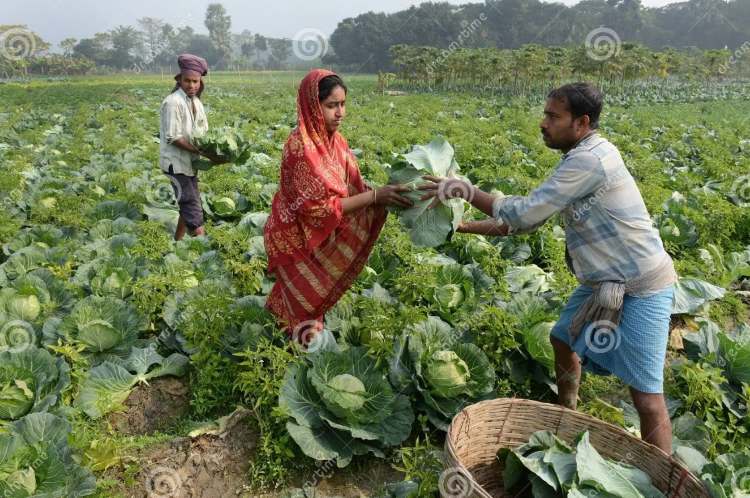Tenant farming remains central to Andhra Pradesh’s agricultural economy. Yet the farmers who lease land face persistent barriers in accessing credit, managing risks, and stabilising incomes. A NABARD-sponsored study in Guntur (2022–23) shows that tenancy, debt and informal lending form a cycle that keeps tenant farmers financially insecure.
The study found that 88% of farmers in Guntur were indebted, with tenant farmers showing the highest levels. Their average outstanding debt of ₹2,07,444 was more than double that of owner cultivators. Their repayment ability is weaker too, revealing how thin their financial margins are.
These outcomes flow directly from unequal access to credit. Tenant farmers rely heavily on informal lenders because banks demand land documents as collateral. The study shows that 60% of tenant loans come from informal sources, often at interest rates of 24–30%. Owner cultivators, with land titles, access cheaper institutional credit and structured repayment plans.
READ I AI trade growth: How WTO’s new forecast changes dynamics
Reform stuck in implementation
The state introduced the Crop Cultivator Rights Card (CCRC) to formalise tenancy and improve access to formal credit. In principle, the card should allow tenants to obtain loans, crop insurance and input subsidies. In practice, progress has been uneven.
District-level issuance varies sharply. Prakasam recorded the highest number of CCRCs in 2021–22, while Chittoor remained at the bottom. In Guntur, only half the surveyed tenants held a card. East Godavari had the highest share of CCRC holders among tenants; Chittoor had the lowest at just 1.4%.
Three obstacles slow down wider adoption. Many landowners resist providing consent because they want to avoid formalising rental arrangements. Banks continue to follow traditional collateral norms even when guidelines permit lending against CCRCs. And many tenants are unaware of the scheme or struggle with the paperwork required to obtain the card.
Debt, climate risks and income deficit
Tenant farmers operate in a risk-heavy environment. More than half the surveyed households reported crop losses caused by erratic rainfall and pest attacks. While tenants use crop insurance more frequently than owners, payouts remain too small to offset actual losses.
This vulnerability is reflected in their incomes. Tenant farmers earn an average per capita income of ₹42,128, far short of their annual consumption needs of ₹76,041. Owner households typically show surpluses, giving them space to reinvest or reduce debt. Tenants, by contrast, borrow repeatedly to meet basic expenses or repay old loans, deepening the debt trap.
Rising production risks and weak financial buffers mean tenant farmers often sell their produce at lower prices to meet repayment deadlines. Lower investment in quality seeds, fertilisers and mechanisation further depresses productivity, reinforcing a structural cycle of low income and high indebtedness.
Fixing credit access for tenant farmers
Andhra Pradesh needs a clearer strategy to break this cycle. Strengthening tenancy documentation is the first step. CCRC processes must be streamlined and digitised, with consistent verification and clear incentives for landowners to cooperate.
Financial institutions should design tenant-focused credit products, including Joint Liability Groups, group guarantees and loans backed by movable assets. These approaches can help bypass the dependence on land-based collateral.
Risk protection also needs reinforcement. Faster crop insurance payouts, better disaster relief and stable procurement mechanisms will reduce the urgency to borrow at high cost. Stronger cooperatives and farmer producer organisations can improve market access and lower input costs, giving tenant farmers more negotiating power.
The Guntur study makes one point clear: tenant farmers form the backbone of cultivation in many parts of Andhra Pradesh but remain outside the formal credit system. Their incomes are inadequate, their debts are rising and their risks are growing.
Fixing this requires more than credit reform. It demands recognition that tenancy is now a structural feature of the state’s agriculture. Ensuring that tenant farmers can access fair credit, insurance and markets is not only an economic priority but a matter of rural social justice. Andhra Pradesh must bring tenants to the centre of agricultural policy if rural growth is to be inclusive and sustainable.
Dr Ghanshyam Pandey is Associate Professor at Jaipuria Institute of Management, Indore, and Dr Barun Kumar Thakur is Associate Professor at FLAME University, Pune.

